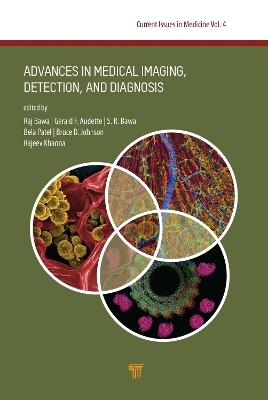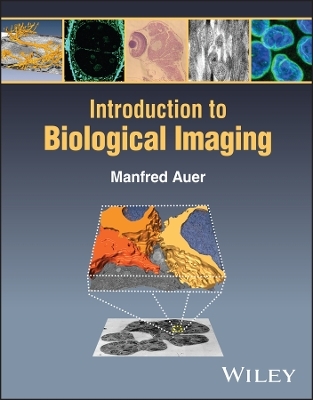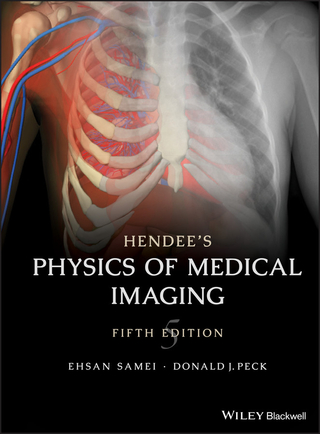
Advances in Medical Imaging, Detection, and Diagnosis
Jenny Stanford Publishing (Verlag)
978-981-4877-46-6 (ISBN)
Medical care is the most critical issue of our time and will be so for the foreseeable future. In this regard, the pace and sophistication of advances in medicine in the past two decades have been truly breathtaking. This has necessitated a growing need for comprehensive reference resources that highlight current issues in specific sectors of medicine. Keeping this in mind, each volume in the Current Issues in Medicine series is a stand‐alone text that provides a broad survey of various important topics in a focused area of medicine—all accomplished in a user-friendly yet interconnected format. This volume addresses advances in medical imaging, detection, and diagnostic technologies. Technological innovations in these sectors of medicine continue to provide for safer, more accurate, and faster diagnosis for patients. This translates into superior prognosis and better patient compliance, while reducing morbidity and mortality. Hence, it is imperative that practitioners stay current with these latest advances to provide the best care for nursing and clinical practices. While recognizing how expansive and multifaceted these areas of medicine are, Advances in Medical Imaging, Detection, and Diagnosis addresses crucial recent progress, integrating the knowledge and experience of experts from academia and the clinic. The multidisciplinary approach reflected makes this volume a valuable reference resource for medical practitioners, medical students, nurses, fellows, residents, undergraduate and graduate students, educators, venture capitalists, policymakers, and biomedical researchers. A wide audience will benefit from having this volume on their bookshelf: health care systems, the pharmaceutical industry, academia, and government.
Raj Bawa, PhD, MD, is president of Bawa Biotech LLC (founded in 2002), a biotech/pharma consultancy and patent law firm based in Ashburn, Virginia, USA. Trained as a microbiologist and biochemist, he is an inventor, author, entrepreneur, professor, and registered patent agent (since 2002) licensed to practice before the US Patent & Trademark Office. He is currently a scientific advisor to Teva Pharmaceutical Industries, Israel (since 2010), and full professor (adjunct) at Northern Virginia Community College, Annandale, Virginia (since 2004). He is vice president and chief IP officer at Guanine, Inc., Rensselaer, New York (since 2017), a company focused on rapid, accurate detection of infective pathogens. He has served as a principal investigator of various National Cancer Institute (NCI) research grants; most recently as a principal investigator of a Centers for Disease Control and Prevention (CDC) grant to develop an assay for carbapenemase resistant bacteria. He was an adjunct professor at Rensselaer Polytechnic Institute, Troy, New York, from 1998 to 2018. After earning a BSc (Honors School) in microbiology, he earned a MS in cancer biology, a PhD in biophysics/biochemistry and an MD. In the 1990s, Dr. Bawa held various positions at the US Patent & Trademark Office, including primary examiner from 1996–2002. Currently, he is a life member of Sigma Xi, cochair of the nanotech and precision medicine committees of the American Bar Association, and founding director of the American Society for Nanomedicine (established in 2008). He has authored over 100 publications, edited 10 texts, and serves on the editorial boards of numerous peer-reviewed journals, including serving as an associate editor of Nanomedicine (Elsevier). Gerald F. Audette, PhD, is associate dean, Faculty of Science, professor of chemistry, and member of the Centre for Research on Biomolecular Interactions at York University, Toronto, Canada. His research focuses on the correlation between protein structure and biological activity of proteins involved in bacterial conjugation, in particular, the type 4 secretion system from the conjugative F-plasmid of Escherichia coli. In addition, his research targets the type IV pilins and associated assembly systems from multiple bacterial pathogens and is exploring the adaptation of these protein systems for applications in bionanotechnology and nanomedicine. Dr. Audette is the co-editor of volumes 1–4 of the Jenny Stanford Series on Nanomedicine and is a subject editor of structural chemistry and crystallography for the journal FACETS. S. R. Bawa, MSc, PhD, is currently scientific advisor at Bawa Biotech LLC, a biotechnology and patent law firm founded in 2002 and based in Ashburn, Virginia. Previously, he was Founding Chairman and Professor of Biophysics at Panjab University, Chandigarh, India (1964–1992). At Panjab University, he also served as Dean of Foreign Students (1986–1988) and Coordinator of the Biotechnology Center (1986–1988). He was president of the Electron Microscopy Society of India (1986–1992), Secretary of the Indian Biophysical Society (1986–1988), and Founding Secretary of the Northern India Science Association (1966–1992). Dr. Bawa received his BSc (University Gold Medal), MSc (University Gold Medal), and PhD degrees in 1949, 1951, and 1954, respectively, from Panjab University. He was a Fulbright Fellow and Instructor (1958–1960) and a Boese Postdoctoral Research Fellow (1959–1960), both at Columbia University. He was an Instructor (1961–1963) in the Department of Anatomy at Cornell University Medical College. In 1964, at the age of 34, he assumed the position of Founding Head and Reader of the newly established Biophysics Department at Panjab University, Chandigarh, India. He was promoted to Professor and Head in 1969. After retiring from Panjab University in 1992, Dr. Bawa joined the David Axelrod Institute of the New York State Department of Health in Albany, New York, from where he retired in 1999. Dr. Bawa has published over 150 scientific papers in peer-reviewed journals, books, and conference proceedings. His numerous accolades include Alexander von Humboldt Fellowship, Germany (five times); Fulbright Fellowship, US; US Alumni Research Travel Grant, US; Boese Postdoctoral Fellowship, Columbia University, US; British Council Invitee, UK; Diatome Award of the Electron Microscope Society of America; PL-480 Research Project and Appreciation Award, US Department of Agriculture; Kazato Research Award, Japan; and National Lectureship, India. He is an elected member or life member of various professional societies and organizations. He has served on various international scientific committees, advisory boards, government expert panels, and held visiting professorships in the US, Canada, and Europe. He has been a member of various peer-reviewed international journal editorial boards, including Ultramicroscopy (1986–1995, Elsevier), Andrologia (1993–1995, Blackwell/Wiley), Acta Anatomica (1974–1977, Karger), Journal of Ultrastructure Research (1969–1985, Elsevier) and Journal of Submicroscopic Cytology (1970–1977, Università di Bologna). Since 2004, the Dr. S. R. Bawa Merit Scholarship is awarded by Panjab University to a student standing first in the BSc (Honors School) class in biophysics. In 2022, Panjab University presented Dr. Bawa the Distinguished Alumnus Award. Bela Patel, MD, is a professor of medicine, vice dean of Healthcare Quality, and division director for Pulmonary, Critical Care and Sleep Medicine at the McGovern Medical School at the University of Texas Health Science Center in Houston. She is regional chief medical officer and executive medical director of Critical Care for Memorial Hermann Hospital Texas Medical Center. Dr. Patel attended the University of Texas in Austin and the University of Texas McGovern Medical School in Houston. She completed her training in internal medicine in 1996 and subsequently a fellowship in pulmonary, critical care and sleep medicine in 1999 also at the University of Texas Health Science Center in Houston. Dr. Patel was appointed as the chief of Pulmonary, Critical Care and Sleep Medicine in 2002 and later appointed the chief of Medicine at Lyndon B. Johnson General Hospital and vice chair of the Department of Medicine in 2007. In 2009, she became the assistant chief medical officer and subsequently regional chief medical officer in 2017 for Memorial Hermann Hospital Texas Medical Center. Through her work in quality and patient safety, she was inducted as a fellow in Clinical Safety and Effectiveness by the University of Texas System. Dr. Patel was appointed as the assistant dean of Healthcare Quality in 2011 and the vice dean in 2017 and supports the 18 vice chairs of quality in Medicine at McGovern Medical School. Dr. Patel’s research interest includes sepsis, ARDS, pulmonary hypertension, cognitive complexity and error reduction in critical care, and quality improvement implementation. Bruce D. Johnson, PhD, is a professor of medicine, professor of physiology, and a consultant in the Department of Cardiovascular Medicine at the Mayo Clinic, Rochester, Minnesota. Additionally, he has joint appointments in the Division of Preventive, Occupational and Aerospace Medicine and in the Department of Physiology and Biomedical Engineering. He is the director of the Mayo Clinical Research Unit’s Energy Balance Core Laboratory and directs his own research laboratory in human integrative and environmental physiology. The majority of his research has focused on factors limiting human performance in various clinical syndromes, in athletes, and under extreme environmental conditions. He has led field studies in Antarctica, funded through the National Science Foundation (NSF), and on Mount Aconcagua in Argentina, Mount Everest, and Mount Kilimanjaro. His research has involved studying unique populations such as breath-hold divers in Croatia and F-22 pilots from the US Air Force. His clinical research focuses on novel methods for the detection and tracking of chronic disease as well as environmental factors that may be involved in disease risk. His laboratory also works closely with consumer and medical device companies that track health status through wearable or passive sensing as well as with early-phase supplement and pharmaceutical company products. His research has been funded by the NIH, DOD, NSF, State of Minnesota, and industry. Rajeev Khanna, MD, is an internal medicine consultant practicing in a group practice in Northern Virginia, as a part of Loudoun Medical Group. He is an internist with interest in long-term management of chronic health problems such as diabetes, high blood pressure, heart disease, and heart failure. He obtained his MBBS and MD in internal medicine from Dayanand Medical College, Ludhiana, Punjab, India, Dr. Khanna was in training for neurology postgraduation (DM) at the Postgraduate Institute of Medical Education and Research, Chandigarh, India before moving to the United States. He completed his residency in internal medicine at PG Hospital Center, Maryland, USA, in 1994. He has been published in multiple peer-reviewed journals.
Current Issues in Medicine: Advances in Medical Imaging, Detection, and Diagnosis
| Erscheinungsdatum | 20.10.2023 |
|---|---|
| Reihe/Serie | Jenny Stanford Series on Current Issues in Medicine, Volume 4 |
| Zusatzinfo | 84 Tables, black and white; 142 Line drawings, color; 31 Line drawings, black and white; 257 Halftones, color; 118 Halftones, black and white; 399 Illustrations, color; 149 Illustrations, black and white |
| Sprache | englisch |
| Maße | 178 x 254 mm |
| Gewicht | 2934 g |
| Themenwelt | Medizin / Pharmazie ► Allgemeines / Lexika |
| Medizin / Pharmazie ► Medizinische Fachgebiete ► Radiologie / Bildgebende Verfahren | |
| Medizin / Pharmazie ► Physiotherapie / Ergotherapie ► Orthopädie | |
| Technik ► Medizintechnik | |
| Technik ► Umwelttechnik / Biotechnologie | |
| ISBN-10 | 981-4877-46-8 / 9814877468 |
| ISBN-13 | 978-981-4877-46-6 / 9789814877466 |
| Zustand | Neuware |
| Informationen gemäß Produktsicherheitsverordnung (GPSR) | |
| Haben Sie eine Frage zum Produkt? |
aus dem Bereich


